-
 bitcoin
bitcoin $87959.907984 USD
1.34% -
 ethereum
ethereum $2920.497338 USD
3.04% -
 tether
tether $0.999775 USD
0.00% -
 xrp
xrp $2.237324 USD
8.12% -
 bnb
bnb $860.243768 USD
0.90% -
 solana
solana $138.089498 USD
5.43% -
 usd-coin
usd-coin $0.999807 USD
0.01% -
 tron
tron $0.272801 USD
-1.53% -
 dogecoin
dogecoin $0.150904 USD
2.96% -
 cardano
cardano $0.421635 USD
1.97% -
 hyperliquid
hyperliquid $32.152445 USD
2.23% -
 bitcoin-cash
bitcoin-cash $533.301069 USD
-1.94% -
 chainlink
chainlink $12.953417 USD
2.68% -
 unus-sed-leo
unus-sed-leo $9.535951 USD
0.73% -
 zcash
zcash $521.483386 USD
-2.87%
Should I run if there are continuous small negative lines with reduced volume? How to judge?
A string of small red candles with low volume may signal weakening sell pressure, not panic — consider context, support levels, and momentum before reacting.
Jun 20, 2025 at 05:00 pm
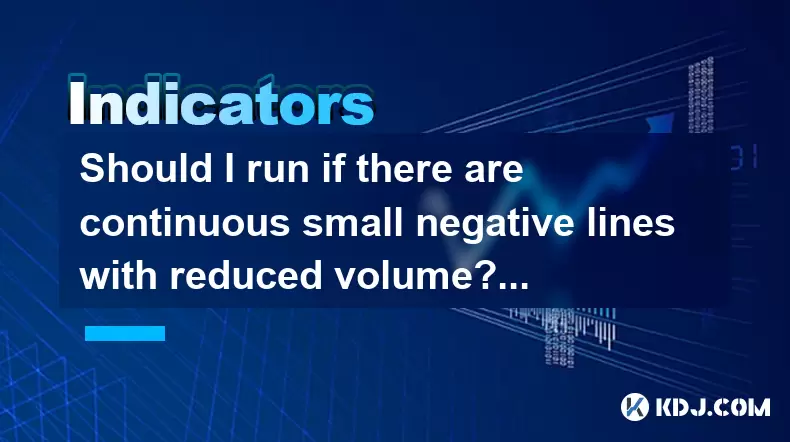
What Are Continuous Small Negative Lines with Reduced Volume?
In the context of cryptocurrency trading, continuous small negative lines refer to a series of candlesticks on a price chart that show minor declines in price over consecutive time intervals. When these small red (or bearish) candles appear alongside reduced volume, it suggests that selling pressure is weakening. Volume refers to the number of assets traded during a specific period; when it decreases, it often signals waning interest from traders.
It's crucial to understand that small negative lines with reduced volume do not necessarily indicate an imminent crash or a strong downtrend. Instead, they may reflect market indecision or consolidation after a prior move. Traders must interpret this pattern within the broader context of the market trend and other technical indicators.
How to Analyze This Pattern in Cryptocurrency Charts
To determine whether you should 'run' — meaning sell your holdings — when observing continuous small negative lines with reduced volume, you need to perform a multi-layered analysis. Start by identifying the overall trend: Is the asset in a bullish, bearish, or sideways phase? If the market has been in a strong uptrend and now shows signs of consolidation through small negative candles and low volume, this could be a healthy pullback rather than a reversal.
Next, examine key support levels. Are the small red candles holding above a critical support zone? If so, it might suggest that buyers are still present in the market. Additionally, check for any divergences between price action and momentum indicators like RSI (Relative Strength Index) or MACD (Moving Average Convergence Divergence). A divergence where the price makes lower lows but the RSI makes higher highs can signal underlying strength despite the short-term dip.
Interpreting Volume in Context
Volume plays a pivotal role in confirming or denying the strength of a price movement. When you see continuous small negative lines with reduced volume, it typically means that the downward move lacks conviction. In many cases, this kind of price action occurs during periods of profit-taking or light selling, especially after a rapid rise in price.
However, if the same pattern appears at key resistance levels or following a prolonged downtrend, it could indicate continued weakness. The absence of volume suggests that neither bulls nor bears are in control. It’s important to compare current volume levels with the average volume over the past 20–30 days to get a clearer picture. If the volume is significantly below average, it reinforces the idea of a lack of interest rather than panic selling.
Evaluating Other Technical Indicators
Relying solely on candlestick patterns and volume can lead to misinterpretation. Therefore, integrating other technical tools into your analysis is essential. For instance, using moving averages such as the 50-day and 200-day can help identify whether the price is still supported by long-term trends. If the price remains above these moving averages during the appearance of small negative candles, it might be a sign of temporary weakness.
Another useful tool is the Bollinger Bands indicator. If the price is hugging the middle band or drifting toward the lower band without breaking it, this may indicate a continuation of the current trend once volatility picks up again. Furthermore, the Ichimoku Cloud can offer insights into potential support/resistance zones and trend direction. If the price remains above the cloud while showing small negative candles, the bullish structure is still intact.
Practical Steps to Take When Facing This Scenario
If you're holding a cryptocurrency that exhibits continuous small negative lines with reduced volume, here’s what you can do:
- Assess your entry point and stop-loss level: If the price hasn’t breached your initial stop-loss and you’re still comfortable with your risk profile, there may be no need to act immediately.
- Review your investment thesis: Ask yourself why you bought the asset in the first place. Has anything fundamentally changed? In crypto markets, sentiment can shift quickly, but fundamentals often dictate long-term value.
- Monitor for a breakout or breakdown: Wait for a clear signal before making a decision. A sharp increase in volume accompanied by a strong candle could confirm either a continuation or a reversal.
- Consider scaling out gradually: Rather than selling everything at once, some traders prefer to reduce positions incrementally as uncertainty rises.
- Use alerts and notifications: Set up price and volume alerts to stay informed without constantly monitoring charts.
Frequently Asked Questions (FAQ)
Q: Does reduced volume always mean weakness?No, reduced volume doesn't always equate to weakness. In fact, during consolidation phases or accumulation periods, volume naturally decreases. It becomes concerning only when it coincides with persistent price drops or breaks below key support levels.
Q: Can I use fundamental analysis to complement this pattern?Yes, combining fundamental analysis with technical signals enhances your decision-making process. For example, if a project has strong development activity, positive news, or upcoming upgrades, a technical pullback may represent a buying opportunity rather than a reason to sell.
Q: Should I ignore all small negative candles?Not necessarily. While isolated small negative candles are usually insignificant, a sequence of them combined with deteriorating indicators or broken support levels should not be ignored. Always evaluate them within the broader technical and contextual framework.
Q: How long should I wait before reacting to this pattern?There's no fixed timeframe. Some traders wait for a daily close below a key moving average, while others look for a weekly confirmation. The key is to define your criteria before entering a trade, so emotions don’t drive your decisions.
Disclaimer:info@kdj.com
The information provided is not trading advice. kdj.com does not assume any responsibility for any investments made based on the information provided in this article. Cryptocurrencies are highly volatile and it is highly recommended that you invest with caution after thorough research!
If you believe that the content used on this website infringes your copyright, please contact us immediately (info@kdj.com) and we will delete it promptly.
- Tokenization, Stablecoins, Remittances: The New York Minute for Global Finance
- 2026-02-01 19:20:01
- BlockDAG Poised for 100x Crypto Opportunity as Presale Enters Final Hours, Promising Massive Gains
- 2026-02-01 19:20:01
- Circle Charts Bold Course: Stablecoins to Reshape Global Finance by 2026
- 2026-02-01 19:25:01
- Big Apple Bites into Blockchain: Ethereum DApps, Exchanges, and Games Navigate a Shifting Crypto Tide
- 2026-02-01 19:15:01
- Cryptocurrency Presales and Pumpfun: The Big Apple's Bold Bet on Digital Gold Rush
- 2026-02-01 19:15:01
- Pi Network Bolsters Mainnet Migration and KYC Enhancements Amidst Ecosystem Growth
- 2026-02-01 19:10:02
Related knowledge
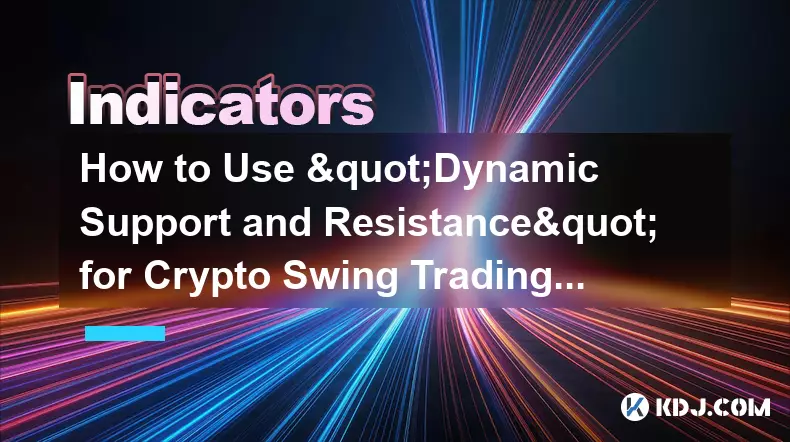
How to Use "Dynamic Support and Resistance" for Crypto Swing Trading? (EMA)
Feb 01,2026 at 12:20am
Understanding Dynamic Support and Resistance in Crypto Markets1. Dynamic support and resistance levels shift over time based on price action and movin...
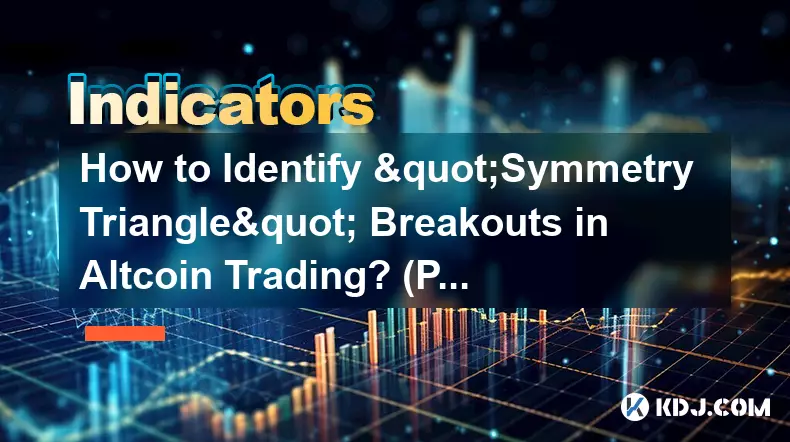
How to Identify "Symmetry Triangle" Breakouts in Altcoin Trading? (Patterns)
Feb 01,2026 at 01:39pm
Symmetry Triangle Formation Mechanics1. A symmetry triangle emerges when price action consolidates between two converging trendlines—one descending an...
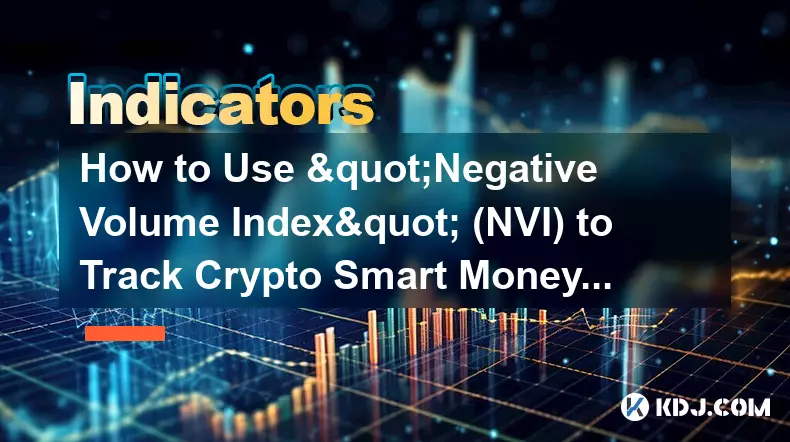
How to Use "Negative Volume Index" (NVI) to Track Crypto Smart Money? (Pro)
Feb 01,2026 at 02:40am
Understanding NVI Mechanics in Crypto Markets1. NVI calculates cumulative price change only on days when trading volume decreases compared to the prio...
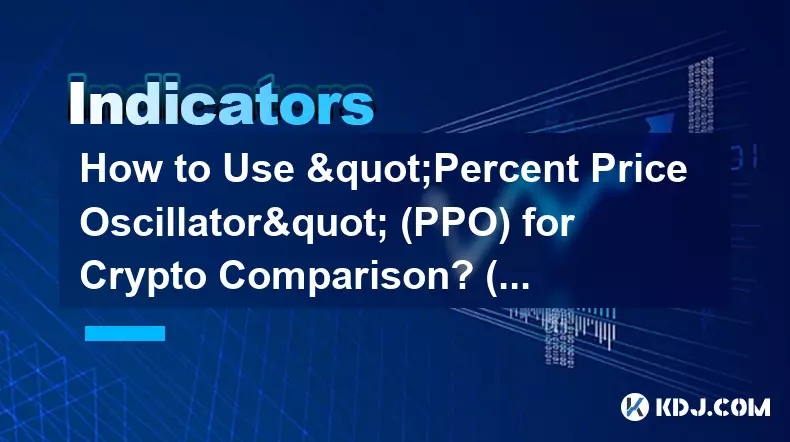
How to Use "Percent Price Oscillator" (PPO) for Crypto Comparison? (Strategy)
Feb 01,2026 at 01:59am
Understanding PPO Mechanics in Volatile Crypto Markets1. The Percent Price Oscillator calculates the difference between two exponential moving average...
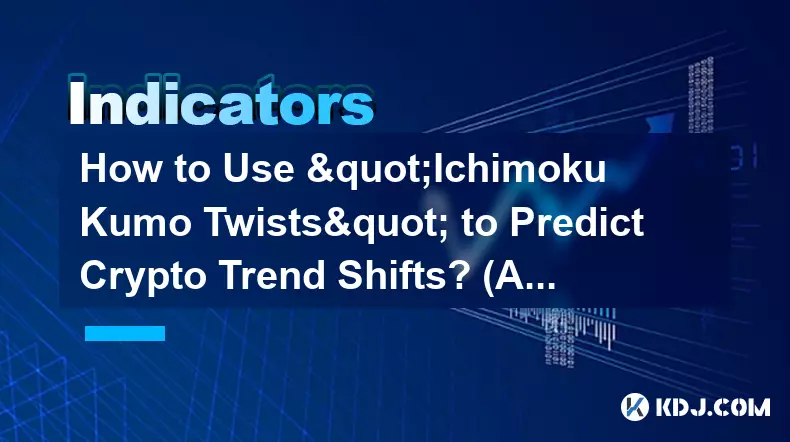
How to Use "Ichimoku Kumo Twists" to Predict Crypto Trend Shifts? (Advanced)
Feb 01,2026 at 10:39am
Understanding the Ichimoku Kumo Structure1. The Kumo, or cloud, is formed by two boundary lines: Senkou Span A and Senkou Span B, plotted 26 periods a...
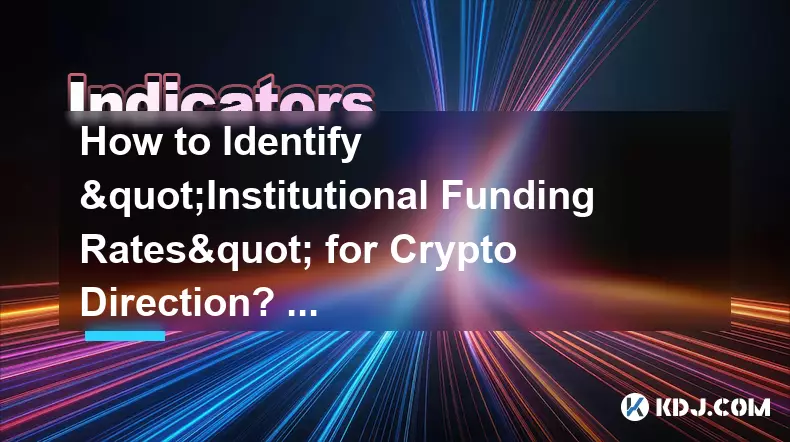
How to Identify "Institutional Funding Rates" for Crypto Direction? (Sentiment)
Feb 01,2026 at 07:20am
Understanding Institutional Funding Rates1. Institutional funding rates reflect the cost of holding perpetual futures positions on major derivatives e...

How to Use "Dynamic Support and Resistance" for Crypto Swing Trading? (EMA)
Feb 01,2026 at 12:20am
Understanding Dynamic Support and Resistance in Crypto Markets1. Dynamic support and resistance levels shift over time based on price action and movin...

How to Identify "Symmetry Triangle" Breakouts in Altcoin Trading? (Patterns)
Feb 01,2026 at 01:39pm
Symmetry Triangle Formation Mechanics1. A symmetry triangle emerges when price action consolidates between two converging trendlines—one descending an...

How to Use "Negative Volume Index" (NVI) to Track Crypto Smart Money? (Pro)
Feb 01,2026 at 02:40am
Understanding NVI Mechanics in Crypto Markets1. NVI calculates cumulative price change only on days when trading volume decreases compared to the prio...

How to Use "Percent Price Oscillator" (PPO) for Crypto Comparison? (Strategy)
Feb 01,2026 at 01:59am
Understanding PPO Mechanics in Volatile Crypto Markets1. The Percent Price Oscillator calculates the difference between two exponential moving average...

How to Use "Ichimoku Kumo Twists" to Predict Crypto Trend Shifts? (Advanced)
Feb 01,2026 at 10:39am
Understanding the Ichimoku Kumo Structure1. The Kumo, or cloud, is formed by two boundary lines: Senkou Span A and Senkou Span B, plotted 26 periods a...

How to Identify "Institutional Funding Rates" for Crypto Direction? (Sentiment)
Feb 01,2026 at 07:20am
Understanding Institutional Funding Rates1. Institutional funding rates reflect the cost of holding perpetual futures positions on major derivatives e...
See all articles
























![[Audio stories] Streamer Became a Billionaire Overnight After Buying One Junk Coin [Audio stories] Streamer Became a Billionaire Overnight After Buying One Junk Coin](/uploads/2026/02/01/cryptocurrencies-news/videos/origin_697eaa9a495ed_image_500_375.webp)

















































